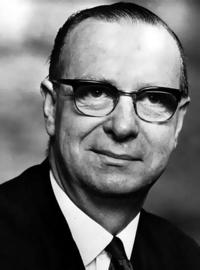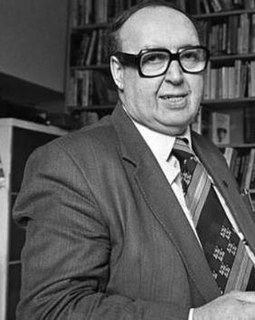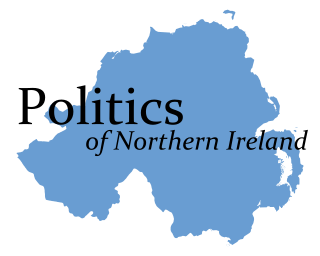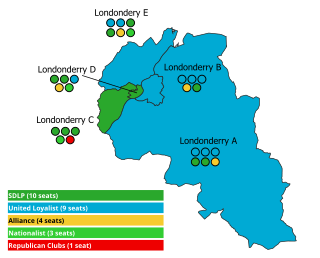Related Research Articles

Gerard Fitt, Baron Fitt was a politician in Northern Ireland. He was a founder and the first leader of the Social Democratic and Labour Party (SDLP), a social democratic and Irish nationalist party.

The Northern Ireland Labour Party (NILP) was a political party in Northern Ireland which operated from 1924 until 1987.
The by-election held in Fermanagh and South Tyrone on 9 April 1981 is considered by many to be the most significant by-election held in Northern Ireland during the Troubles. It saw the first electoral victory for militant Irish republicanism, which the following year entered electoral politics in full force as Sinn Féin. The successful candidate was the IRA hunger striker Bobby Sands, who died twenty-six days later.
Harry Diamond (1908–1996) was a socialist and an Irish nationalist. He was the MP for Belfast Falls in the Parliament of Northern Ireland, and later the leader of the Republican Labour Party.

Patrick Joseph "Paddy" Devlin was an Irish socialist, labour and civil rights activist and writer. He was a founding member of the Social Democratic and Labour Party (SDLP), a former Stormont MP, and a member of the 1974 Power Sharing Executive.
The Irish Independence Party (IIP) was a nationalist political party in Northern Ireland, founded in October 1977 by Frank McManus and Fergus McAteer. The party was effectively a merger of Unity and the Nationalist Party, as the bulk of activists and councillors from the two movements joined IIP. However several independent councillors also joined the party. It was boosted in the late 1970s by the defection of a prominent Protestant Larne Social Democratic and Labour Party (SDLP) councillor, John Turnley, later the party chairman, who was killed in 1980 in Carnlough, County Antrim, by an attack claimed by the Ulster Defence Association.
Belfast is the largest city and capital of Northern Ireland. It is partly located in County Antrim and partly in County Down.

The 1982 Northern Ireland Assembly elections were held on 20 October 1982 in an attempt to re-establish devolution and power-sharing in Northern Ireland. Although the Northern Ireland Assembly officially lasted until 1986 it met infrequently and achieved very little.

The 2007 election to the Northern Ireland Assembly was held on Wednesday, 7 March 2007. It was the third election to take place since the devolved assembly was established in 1998. The election saw endorsement of the St Andrews Agreement and the two largest parties, the Democratic Unionist Party (DUP) and Sinn Féin, along with the Alliance Party, increase their support, with falls in support for the Ulster Unionist Party (UUP) and the Social Democratic and Labour Party (SDLP).

The 1986 Northern Ireland by-elections were fifteen by-elections held on 23 January 1986, to fill vacancies in the Parliament of the United Kingdom caused by the resignation in December 1985 of all sitting Unionist Members of Parliament (MPs). The MPs, from the Ulster Unionist Party, Democratic Unionist Party and Ulster Popular Unionist Party, did this to highlight their opposition to the Anglo-Irish Agreement. Each of their parties agreed not to contest seats previously held by the others, and each outgoing MP stood for re-election.
The Newtownabbey Labour Party is a minor political party based in Newtownabbey, Northern Ireland.

The Belfast South by-election was held on 4 March 1982 following the death of Robert Bradford, Ulster Unionist Party (UUP) Member of Parliament for Belfast South.
Denis Haughey is a former Irish nationalist politician in Northern Ireland.
Danny O'Connor is a former Irish nationalist politician in Northern Ireland. He was a member of Larne Borough Council from 1997 to 2011.

The 2011 election to the Northern Ireland Assembly took place on Thursday, 5 May, following the dissolution of the Northern Ireland Assembly at midnight on 24 March 2011. It was the fourth election to take place since the devolved assembly was established in 1998.

Peter Hadden was a leading member of the Socialist Party in Northern Ireland.
Robert Martin McBirney QC, known as Martin McBirney, was a magistrate and politician from Northern Ireland who was assassinated.

The 2015 United Kingdom general election in Northern Ireland was held on 7 May 2015 and all 18 seats were contested. 1,236,765 people were eligible to vote, up 67,581 from the 2010 general election. 58.45% of eligible voters turned out, an increase of half a percentage point from the last general election.This election saw the return of Ulster Unionists to the House of Commons, after they targeted 4 seats but secured 2.

The 1973 Londonderry City Council election took place on 30 May 1973 to elect members of Londonderry City Council in Northern Ireland. This was on the same day as other Northern Irish local elections. The campaign was significant in that, following changes to the election process and districts, Irish nationalist parties were able to take control of the council for the first time.
References
- 1 2 Committee on the Judiciary, Northern Ireland - a role for the United States?, p.106
- 1 2 3 4 David Boothroyd, Politico's guide to the history of British political parties, p.329
- ↑ W. D. Flackes, Northern Ireland, a political directory, 1968-79, p.148
- ↑ "South Antrim 1973-1982", Northern Ireland Elections